English Words in Action, Group H
(a variety of English words which have developed through history and are currently used in our modern age)
Simply click on this banner (or the following link) and you will be on your way to stimulate your brain for greater word comprehension with quizzes based on some of the words in this unit.
1. Something which is potentially very precarious or unsafe.
2. A dangerous or otherwise unwanted out come; especially, one resulting from the failure of an engineered system.
3. A natural or constructed obstacle on a golf course: When Jake was playing golf there was a sand trap and a small lake that were hazards which he hoped to avoid.
4. Etymology: from Arabic al-zahr, "a gambling term, a die (one of a pair of dice)" and then hazard evolved from being the name of a game of chance (gambling) to a more general meaning of any "chance, risk, peril, or danger".
2. A dangerous or otherwise unwanted out come; especially, one resulting from the failure of an engineered system.
3. A natural or constructed obstacle on a golf course: When Jake was playing golf there was a sand trap and a small lake that were hazards which he hoped to avoid.
4. Etymology: from Arabic al-zahr, "a gambling term, a die (one of a pair of dice)" and then hazard evolved from being the name of a game of chance (gambling) to a more general meaning of any "chance, risk, peril, or danger".
hazard (verb), hazards; hazarded; hazarding
1. To risk losing something in an attempt to win or to achieve an objective: Frank decided to hazard a few dollars in the gambling casino in hopes of winning more than he might lose.
2. To offer a guess or an opinion even though it might be wrong: The teacher asked his students, who were studying vocabulary, if anyone would like to hazard a guess as to what "nostalgia" meant.
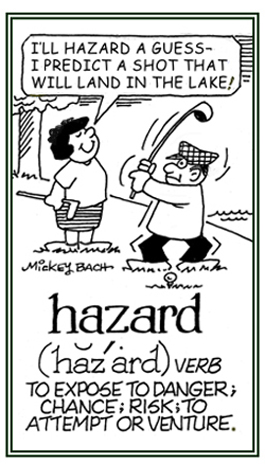
© ALL rights are reserved.
Go to this Word A Day Revisited Index
2. To offer a guess or an opinion even though it might be wrong: The teacher asked his students, who were studying vocabulary, if anyone would like to hazard a guess as to what "nostalgia" meant.

Go to this Word A Day Revisited Index
so you can see more of Mickey Bach's cartoons.
hazardous (adjective), more hazardous, most hazardous
1. A reference to being potentially very dangerous to living beings or to an environment: When people throw away their garbage and it lands in the sea, it can be very hazardous for the fish and other sea creatures.
2. Relating to jeopardy; perilous: Being a mountain climber can be very risky or hazardous; especially, if the weather conditions turn bad and he or she cannot return to the lodge or campsite in time.
3. Descriptive of someone who is depending excessively on chance or luck: Ricky seemed to be a hazardous type of person, being quite bold and reckless when driving his car at high speeds and overtaking others without checking to see if other drivers were approaching on the other side of the road.
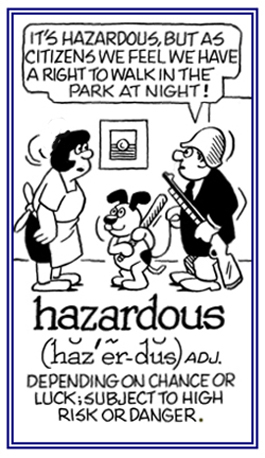
© ALL rights are reserved.
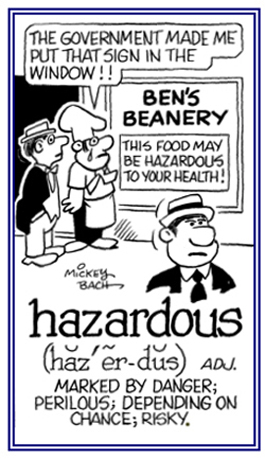
© ALL rights are reserved.
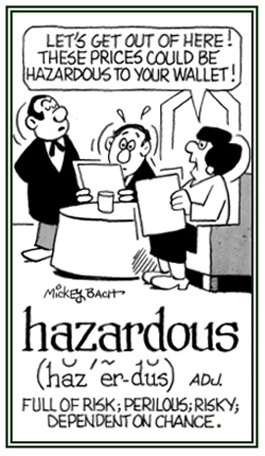
© ALL rights are reserved.
Go to this Word A Day Revisited Index
2. Relating to jeopardy; perilous: Being a mountain climber can be very risky or hazardous; especially, if the weather conditions turn bad and he or she cannot return to the lodge or campsite in time.
3. Descriptive of someone who is depending excessively on chance or luck: Ricky seemed to be a hazardous type of person, being quite bold and reckless when driving his car at high speeds and overtaking others without checking to see if other drivers were approaching on the other side of the road.



Go to this Word A Day Revisited Index
so you can see more of Mickey Bach's cartoons.
1. Attention or notice: Take heed because a tornado warning has been made by the weather people.
2. Serious attention paid to someone or to something; such as, a warning, a piece of advice, or a request: Sam didn't listen to the heed that was given on the radio and TV regarding the tornado warnings and his house collapsed around him.
3. Etymology: Old English hedan, "to take care, attend", from West Germanic hodjan. The term essentially survives only in literary use and as the object of verbs ("take heed", etc.).
2. Serious attention paid to someone or to something; such as, a warning, a piece of advice, or a request: Sam didn't listen to the heed that was given on the radio and TV regarding the tornado warnings and his house collapsed around him.
3. Etymology: Old English hedan, "to take care, attend", from West Germanic hodjan. The term essentially survives only in literary use and as the object of verbs ("take heed", etc.).
heed (verb), heeds; heeded; heeding
1. To pay close attention to while hearing something; especially, to the advice or warnings that have been presented: There are many who heeded the warnings by the authorities and so they escaped safely.
Some people were not heeding the advice to find a better shelter and so they lost their lives.
2. To seriously consider what someone seems to know and to take it into account when considering what to do: Craig urged his children to heed the weather report, which was predicting freezing rain, before deciding to go downtown to see a movie.Many people will be heeding the President's call to vote in the next election; but they may not necessarily vote for him.
Anybody who pays attention to the suggestions and instructions of someone who is authorized to provide such advice: The children were heeders of their parents' warnings about what to do in case of a fire and, as a result, they all escaped from their house safely after it caught on fire the previous week.
heedless (adjective), more heedless, most heedless
Not paying careful attention: There is a more heedless use of natural resources in many parts of the world now than that which has taken place before.
The heedless utilization of water could result in severe shortages.
1. Considerable size and weight; something or someone who is heavy: Steve took a look at the heftiness of the box and decided to get someone to help him lift it and to carry it into the basement.
2. Muscular and powerful strength: The weight lifter at the sports event possessed a heftiness that amazed the judges and the other people who were watching him in the competition.
2. Muscular and powerful strength: The weight lifter at the sports event possessed a heftiness that amazed the judges and the other people who were watching him in the competition.
hefty (HEF tee) (adjective), heftier; heftiest
1. Big and strong in physique: The gym trainer was the heftiest person Ingrid had ever seen.
2. Large and heavy to lift: Janette was about to carry a hefty load; so, Jim offered to help her.
3. Expensive as when involving a large sum of money: The new tractor for the farm carried a hefty price tag.
4. Delivered with or characterized by great force and power: The hefty winds from the hurricane blew the roof off the barn.
5. Requiring a lot of effort to do; strenuous: It takes some hefty strength to climb the mountains.
6. Much larger than is usual or required: The government declared that the financial debt would be a hefty sum.
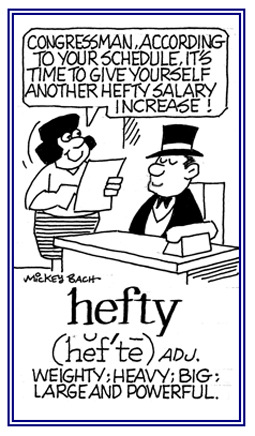
© ALL rights are reserved.
Go to this Word A Day Revisited Index
2. Large and heavy to lift: Janette was about to carry a hefty load; so, Jim offered to help her.
3. Expensive as when involving a large sum of money: The new tractor for the farm carried a hefty price tag.
4. Delivered with or characterized by great force and power: The hefty winds from the hurricane blew the roof off the barn.
5. Requiring a lot of effort to do; strenuous: It takes some hefty strength to climb the mountains.
6. Much larger than is usual or required: The government declared that the financial debt would be a hefty sum.

Go to this Word A Day Revisited Index
so you can see more of Mickey Bach's cartoons.
heinous (adjective), more heinous, most heinous
1. Shockingly brutal, cruel, and hateful: It would be a heinous act of betrayal to disclose comments made during a religious confession.
2. Grossly wicked or reprehensible; abominable: The shooter of the students committed a heinous crime.
3. Etymology: from Old French haineus; from French haineux, from haine, "hatred"; and hair, "to hate".
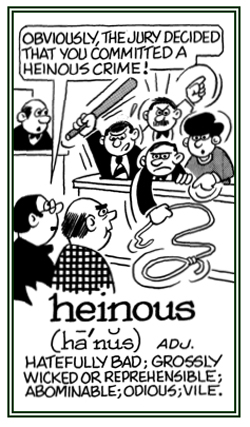
© ALL rights are reserved.
Go to this Word A Day Revisited Index
2. Grossly wicked or reprehensible; abominable: The shooter of the students committed a heinous crime.
3. Etymology: from Old French haineus; from French haineux, from haine, "hatred"; and hair, "to hate".

Go to this Word A Day Revisited Index
so you can see more of Mickey Bach's cartoons.
heinously (adverb), more heinously, most heinously
Terribly evil and extremely reprehensible: Robert Louis Stevenson portrayed a heinously evil doctor in his story Dr. Jekyll and Mr. Hyde.
The quality of being grossly wicked and representing abominable behavior: The journalists were horrified by the heinousness of the crime which was beyond description.
hello (interjection)
1. Used as an expression of strong feeling or emotion: Susan's mother spoke to her, "Hello! Don't you realize what you are doing!"
2. A means of expressing surprise: Greg commented, "Hello! You're finished already!"
3. Etymology: alteration of hallo, which is an alteration of hollo, holla, which is a shout to attract attention. Perhaps from holla!, "stop, cease!"
2. A means of expressing surprise: Greg commented, "Hello! You're finished already!"
3. Etymology: alteration of hallo, which is an alteration of hollo, holla, which is a shout to attract attention. Perhaps from holla!, "stop, cease!"
A greeting: Mildred was getting friendly hellos from her colleagues for the great work that she did on the project.
hello (verb), helloes; helloed; helloing
1. To say or to shout as a greeting: James helloed Mike when they met downtown.
2. Used to welcome someone in a friendly way, on the phone, in e-mails, etc.: The clerk at the store answered the phone by saying, "Hello, this is Jeremy, how may I help you?"
2. Used to welcome someone in a friendly way, on the phone, in e-mails, etc.: The clerk at the store answered the phone by saying, "Hello, this is Jeremy, how may I help you?"
In fact, Jeremy was helloing people many times every day.
Joe started his e-mail with, "Hello Marlon, it was good to hear from you again."
Links to all of the groups of English words in action, Groups A to Z.
You may see the bibliographic list of sources of information for these words in action.


